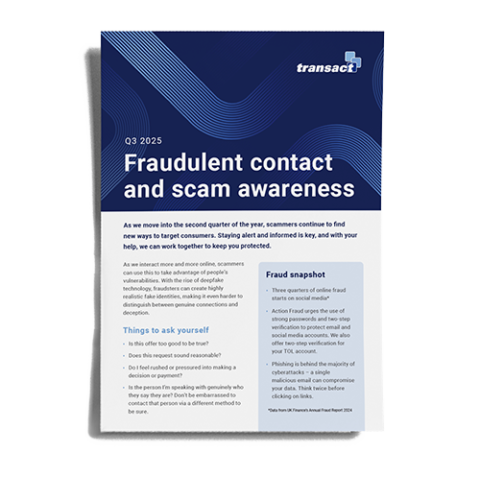LOOKING AFTER YOU AND YOUR CLIENTS MONEY
The service and security we provide are equally important. Looking after our mutual clients’ investments is of paramount importance to us and the business process decisions we make are made with client security in mind.
| Scams |
|---|
| Pension scams - pension scammers continuously design new and more sophisticated ways to gain access to pension savings. |
| Investment scams - fraudsters can be effective in persuading victims to transfer money to them to invest in unusual/high risk investments or to simply steal it outright. |
| Romance fraud - this involves people being duped into sending money to criminals who go to great lengths to gain their trust and convince them that they are in a genuine relationship. |
| Social engineering and safe account scams - fraudsters have a variety of methods to convince people in releasing personal information such as date of birth, address, bank account details, one-time passwords. |
Video guides
Below is a suite of videos giving you an introduction plus information covering common scams, some top tips and the security Transact Online provides. These videos introduce you to George Quigley. George is a certified security and data privacy professional with extensive experience gained across consulting, advisory and audit roles. He is also the director at Foulkon Ltd, specialists in cyber security, and provides some very useful insights to help you feel safe and secure online.
- Online Security – Introduction
- Online Security – Common scams
- Online Security – Top tips
- Online Security – Transact Online
“It’s great to see the progress in these areas and to work with a provider who treats data security as highly as we do.” – Anonymous Transact User
What you can do to improve online security
The COVID-19 pandemic has seen criminals swiftly adapt and evolve their methods to take advantage of the increase in remote working with people spending more time online and communicating more by email. Fraudsters continue to target individual’s email accounts either to obtain personal information for further social engineering or to impersonate that individual.
Impersonation scams saw the biggest increase of any scam type, almost doubling in 2020 compared to 2019. Typically, such deception and impersonation scams involve the criminal posing as a genuine individual or organisation and contacting the victim.
Follow the simple steps below to make your personal data and investments more secure. Visit: ncsc.gov.uk/cyberaware/home for more guidance on improving your personal cyber security.
Scams originating from emails
We have seen an increase in the number of fraudulent attempts that originate from clients’ personal email accounts and computers being compromised. Over the last year we have identified that there has been an increase in the following types of fraud:
- A client’s email is compromised. The fraudsters impersonates the client by contacting the client’s adviser about withdrawals and attempt to divert the money to their own bank account.
- An adviser’s email is compromised. The fraudster impersonates the adviser, by sending the client their own bank account details but presenting them as the Transact bank account details.
Since Omicron, a new variant of the COVID-19 virus, became prevalent there have been cybercriminals creating Omicron-themed phishing scams.
In one phishing email, cybercriminals impersonate the United Kingdom’s National Health Service (NHS). The email appears to be an offer for a new COVID-19 Omicron PCR test. If you click the link within the email, you’re sent to an NHS look-alike website where you are asked to provide your personal details and payment information. Any information you enter on this fake webpage is delivered straight to the cybercriminals.
Follow these tips to avoid similar phishing attacks:
- Although the scam is to impersonate the NHS, you may also see hackers from other countries using a similar scam. Watch out for suspicious emails from both local and global health organisations.
- Never click on a link within an email that you weren’t expecting, even if the email appears to come from an organization you recognise.
- Stay informed about the Omicron variant by following local news and other trusted sources.
We share only a small level of detail of the security measures we have in place. That way, you can be confident that your clients’ investments are safe, and fraudsters can’t use what we share to their advantage. However, if you would like to know more or have any specific questions, please do call and we will address your queries.
If at any time you have any suspicions or concerns about any transactions or activity on your clients’ portfolios, act immediately and get in touch.
